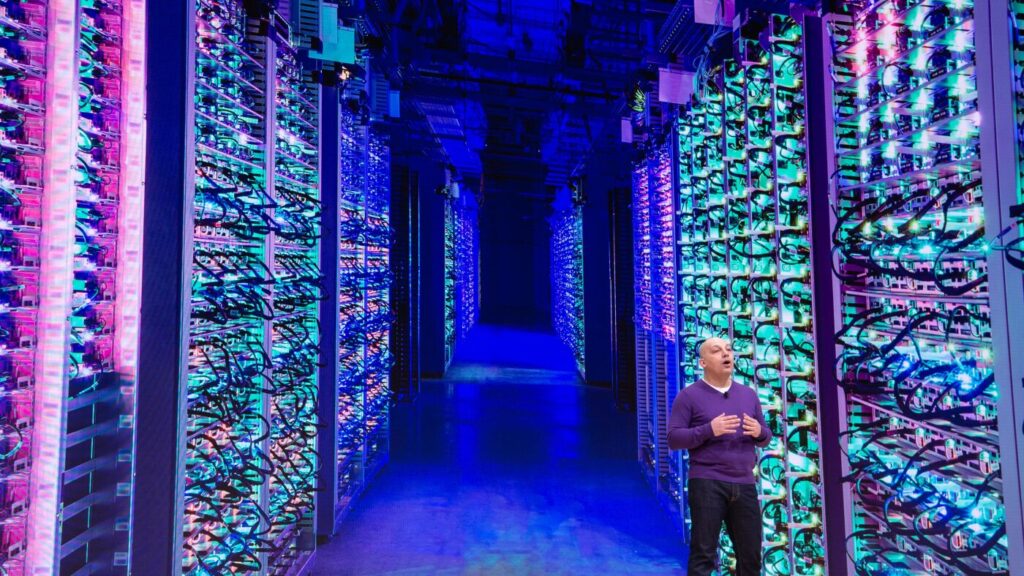Google Vice President Majid Bakr speaks on stage during the annual conference in San Francisco with the backdrop of a large data center.
Josh Adelson/AFP via Getty Images
Hide caption
Toggle the caption.
Josh Adelson/AFP via Getty Images
Researcher Jesse Dodge did some back-of-the-napkin math about the energy consumption of AI chatbots.
“One query for ChatGPT uses about as much electricity as lighting a light bulb for about 20 minutes,” he says. “So, you can imagine millions of people using something like this every day, which adds up to a really large amount of electricity.”
He is a senior research analyst at the Allen Institute for AI studying how artificial intelligence uses energy. To generate its answers, AI uses much more power than traditional internet uses, such as search queries or cloud storage. According to a Goldman Sachs report, a ChatGPT query requires about 10 times more power than a Google search query.
And as AI becomes more sophisticated, it requires more energy. In the US, the majority of this energy comes from burning fossil fuels like coal and gas, which are the main drivers of climate change.
Most companies working on AI, including ChatGPT maker OpenAI, don't disclose their output. But, last week, Google released a new sustainability report with a glimpse of that data. Within the 86-page report, Google said its greenhouse gas emissions rose 48 percent last year from 2019. It attributed the increase to its data center energy consumption and supply chain emissions.
“As we further integrate AI into our products, reducing emissions may be difficult,” the report said.
Google declined an interview with NPR.
“Larger and larger data centers up to supercomputers”
Google aims to reach net zero emissions by 2030. Since 2007, the company has stated that its company operations were carbon neutral because it purchases carbon offsets to cover its emissions.
But, starting in 2023, Google wrote in its sustainability report that it is no longer “maintaining operational carbon neutrality.” The company says it is still pushing for its net-zero goal in 2030.
“Google's real motivation here is to build the best AI system they can,” Dodge says. “And they're willing to put a lot of resources into it, including things like training AI systems on supercomputers and large data centers, which consumes a lot of electricity and therefore CO2 emissions. “
Microsoft has taken its climate pledge a step further than Google, saying it will become carbon negative by 2030. But, it too faces a setback due to its focus on AI. In its sustainability report released in May, Microsoft said its emissions have increased 29 percent since 2020 due to the construction of more data centers that are “designed and optimized to support AI workloads.” are made.”
“The infrastructure and power required for these technologies creates new challenges for meeting sustainability commitments in the tech sector,” the report said.
A company spokesperson declined to comment further.
AI has a deep thirst for energy.
AI requires computer power from thousands of servers that are housed in data centers. And these data centers require large amounts of electricity to meet this demand.
Northern Virginia has become the epicenter of the growing data center industry. According to the Washington Post, data centers in this corner of the state will need enough energy to power six million homes by 2030.
According to another Washington Post report, the country's thirst for electricity has become so severe that plans to shut down several coal plants have been delayed.
“There's a whole physical infrastructure that needs to be built to support AI,” says Alex Hanna, director of research at the Distributed AI Research Institute. He worked on Google's ethical AI team, but left the company in 2022 after handling a research paper that highlighted the environmental costs of AI.
Hanna says the data center boom will continue “as long as there are organizations that are fully committed to AI.”
Goldman Sachs has researched the projected growth of data centers in the U.S. and estimates that they will consume 8 percent of total electricity in the country by 2030, up from 3 percent in 2022. “The spread of AI technology, and the data centers necessary to feed it” will drive demand for electricity “the likes of which has not been seen in a generation,” say the company's analysts.
According to Bloomberg, there are currently more than 7,000 data centers worldwide. That's up from 3,600 in 2015. Bloomberg estimates that these data centers use as much electricity as the entire country of Italy each year.
“AI-first” world
All major tech companies are going full throttle on AI. Alphabet CEO Sundar Pichai has called Google an “AI-first” company. Over the past few months, the company released its Gemini chatbot to the world and added its AI overview tool to Google Search. Facebook parent Meta has added chatbots to several of its products. And Apple last month announced a partnership with OpenAI to bring AI to its Siri digital assistant.
During first-quarter earnings, all of these companies said they were investing billions of dollars in AI.
Google said it spent $12 billion on capital expenditures in the quarter alone, which was “heavily driven” by investments in data centers to boost its AI efforts. The company said it expects to maintain the same level of expenses throughout the year.
AI researcher Hanna says the environmental costs of artificial intelligence will only get worse unless there is serious intervention.
“There's a lot of people out there who talk about the threat around AI, about a rogue thing that somehow takes control of a nuclear weapon or whatever,” Hanna says. Hina says. “It's not a real existential threat. We have an existential crisis right now. It's called climate change, and AI is clearly making it worse.
Editor's note: Google and Microsoft are among NPR's financial backers.
